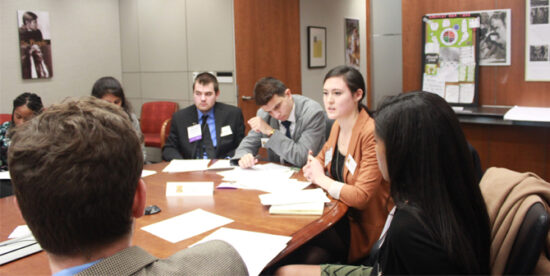
On April 20, the U.S. Department of State recognized ten gifted global youth with the Emerging Young Leaders Award for their dedication to promoting peace and attacking complex world issues. From empowering combating violent extremism, to creating opportunities for their at-risk peers, the awardees are all accomplished leaders who continue to strengthen their communities and search for innovative solutions. The Emerging Young Leaders Award is just one of many initiatives aimed at spotlighting young talent and engaging millennials in international affairs.
How are youth leaders assets to the exchange field? According to A. Trevor Thrall and Erik Goepner’s research entitled “Millennials and U.S. Foreign Policy”, millennials are more supportive of soft power tactics and global partnerships, which Thrall and Goepner argue is caused by increasing hyperconnectivity and diversity. In a globalized world, it is important to have cross-border collaboration, and with more multicultural awareness, the younger generation is paving the way for the peace-building movement and a brighter future.
Global Ties U.S. recognizes that today’s young leaders will be tomorrow’s changemakers, so we place special emphasis on providing our own young leaders with professional development opportunities. One of the ways we do this through our unique Emerging Leaders Program, in which outstanding interns and volunteers from our CBMs across the country come to Washington, DC for our annual National Meeting. Over the course of four days, these young citizen diplomats immerse themselves in the world of public diplomacy and international exchange by attending the gathering’s events and sessions. We also provide them with professional development sessions featuring current leaders in the field.
This past year, we were thrilled to have 19 participants in the Emerging Leaders Program, representing CBMs in 15 states. While attending Exchanges Matter! A Strategic Dialogue, the participants observed professionals from nonprofit, corporate and government sectors discuss using exchanges to support foreign policy objectives. Following the Dialogue was a special National Program Agencies (NPA) panel, in which representatives from IIE, Graduate School USA, FHI360, and Meridian International Center gave the emerging leaders an overview of how NPAs work and their role in the diplomacy field. Program officers additionally provided the young leaders with real-world career and job-hunting advice.
An annual Emerging Leaders Program highlight is the afternoon spent at the Department of State in private meetings with senior U.S. officials. This year, they met with an U.S. ambassador who had recently returned from overseas for a posting in Washington. Next, they participated in an inter-active diplomacy simulation, led by the U.S. Diplomacy Center. And finally, they spent time with a panel of young State Department staffers who shared their individual stories and offered helpful tips for finding a job at the State.
The impact of the Emerging Leaders Program is best described by participant Joy Young of Global Ties San Francisco. “It was genuinely one of the best experiences I’ve had personally and professionally, especially given how much I’ve thought about working in DC for the past two years or so!” she writes. “I think it’s also safe to speak for the entire group when I say that the people, work, and issues we were exposed to, the connections we made with each other, and the introduction to the network have made an incredible and lasting impact.”
The Emerging Leaders Program is just one example of Global Ties’ efforts to engage young people in the realm of international exchange. By creating meaningful experiences, and providing professional insight, inspiration, and connections, the Global Ties U.S. Emerging Leaders Program is proud to support tomorrow’s changemakers on their path to creating a more secure, just, and prosperous world. This would not be possible without the contributions of our incredible network and sponsors, including Al and Sharon Durtka. By engaging young leaders, we open the doors to a lifetime of opportunity and lasting relationships that can help to tackle some of our biggest global challenges and shape the future of our world.
In an ever-changing foreign policy landscape, it is critical that we continue to bring fresh ideas and new life to diplomacy to strengthen cross-cultural ties. Our Emerging Leaders Program and the Department of State’s Emerging Young Leaders Award are just two of many initiatives that encourage millennial involvement in the global conversation because we believe it is not only beneficial, it is necessary. We are excited for the future of international exchanges, and enhancing programs such as these.
By Judy Donner, Program Manager, Procurement & Services, Global Ties U.S.
